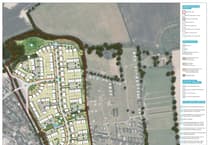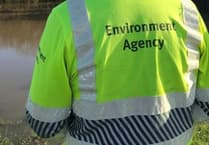Campaigners believe it is an “absolute miracle” no one has been killed following a third major cliff collapse at Whipsiderry on Saturday near to where a developer proposes to build a luxury housing development.
The Save Whipsiderry Cliff group believes around 2,000 tonnes of rock fell onto the beach at around 8.30am.
The latest cliff collapse follows developer Living Quarter Properties (Porth) Limited submitting an application to discharge a condition of its planning permission to build seven luxury villas on the site of the former Paradise Cove Hotel, which includes a new slope stability report.

Lyndsey Young from the Save Whipsiderry Cliff group, which opposes the plans, said: “Our commissioned geotechnical reports, advice from experts and the obvious cracks in the cliff face suggested that there was going to be another substantial fall, so it’s not surprising that the cliff has fallen.
“This is two weeks after the developer submitted an application to Cornwall Council to redischarge condition two of their planning permission with a geotechnical report which stated: “The (previous) landslip has provided benefits to the cliffs stability.”
“They are suggesting that the cliff can be stabilised without concreting the caves, but only using a system of rock bolts and mesh.
“The Save Whipsiderry group have submitted an objection to Cornwall Council to decline this application, as it lacks any detail of the proposed stabilisation method, and is based on assumptions, many of which are not backed up with evidence.
“The proposed stabilisation works pose a serious risk to beach users, workers and are unlikely to protect the development from further cliff failures.
“The volume of this latest rockfall is estimated to be up to 2,000 tones, is unlikely to have been prevented by bolting and meshing.
“There are many more visible cracks on the cliff face which suggests there is more to fall.
“How no one has died is an absolute miracle. What we want is for Cornwall Council to see sense, to accept that this is not a suitable site for development and to put a halt to the planning permission. The public have already been robbed of a beach.
“Enough is enough.”


.jpg?width=209&height=140&crop=209:145,smart&quality=75)

Comments
This article has no comments yet. Be the first to leave a comment.